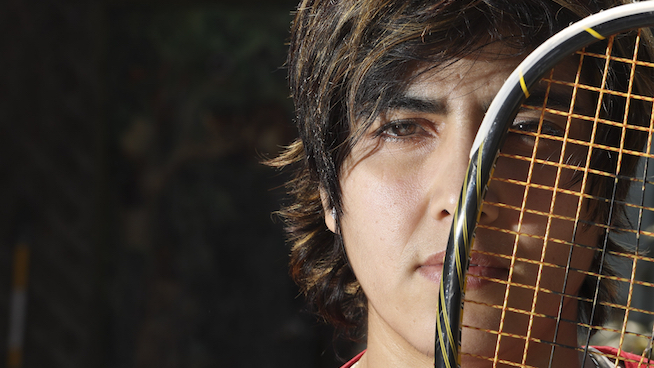How One Pakistani Woman Used Squash to Help Her Escape the Terror of the Taliban
Maria Toorpakai, a 27-year-old professional squash player, grew up as a sports-loving tomboy in Pakistan. As you may imagine, that wasn’t exactly easy.
Toorpakai outline a wild childhood that involved dressing up as a boy so she could play sports and eventually led to her being the number one ranked female squash player in Pakistan—in spite of death threats from the Taliban.
Toorpakai grew up in Waziristan, a mountainous region that stretches from northwestern Pakistan into eastern Afghanistan. It’s largely known for its long-standing, heavy Taliban presence. Girls in this region rarely go to school—let alone play sports. From the beginning, Toorpakai saw this as injustice. When she was just 4 years old, she decided to cut her hair short, burn all of her dresses and began dressing like her brothers. She also took an interest in sports.
When her family moved to a more populated area when she was 12, she began competing in sports competitively. Under the name “Genghis Khan,” Toorpakai entered competitive weightlifting events and competed under the guise that she was a boy. After two months of training, she entered a local boys’ weightlifting championship and defeated the males in her event. But as she progressed in her weightlifting, another sport began to catch her eye—squash.
Similar in some respects to racquetball, squash is a high-energy sport that requires great agility, hand-eye coordination, conditioning and technique. It’s the second biggest sport in Pakistan, and the country has produced talents like multi-time world champion Jahangir Khan. Her father supported her decision, and they planned to enter her into the PAF squash academy. But when the academy director required a birth certificate for her admission, her true identity was revealed. But that didn’t extinguish her passion for squash. She spent hours training by herself, as the boys had ostracized her upon realizing she was a girl and no local girls were willing to join her. She competed in international tournaments, where girls were allowed to participate, and often did quite well. When she was 16, she won the bronze medal at the world junior championships. By 2012, she was Pakistan’s No. 1 female squash player.
That success drew the attention of the Taliban, who believed she had no business competing in sports and despised her rebellious ways. “When I started performing, it was another obstacle—I got threats from the Taliban,” Toorpakai says. “(There were) bombs blasting everywhere at that time, but I was so much focused on squash. When the threats came to me, I had to start making very measured decisions.”
For the next three and a half years, Toorpakai couldn’t play competitive squash. She trained for nearly 10 hours a day in her room and began sending emails to different schools and academies all over the world. In these emails, she offered to help coach the school’s squash team while also using their facilities to train herself. She says she wrote nearly 85 emails a day over a period of four years before finally finding a connection. Jonathon Power, the former No. 1 ranked squash player in the world, ran an academy in Canada. When he heard Toorpakai’s story, he invited her to train at his academy. She was overjoyed and accepted his invitation.
“Everything worked out. For me, it’s a miracle. The way I grew up, (my) first achievement was to be myself,” Toorpakai. “I was so happy to see that so many Pakistani people and media came to support (me).”
Toorpakai currently lives in Toronto and continues to play competitively to this day. The International Olympic Committee recently appointed her to a role on their Women in Sports Commission, where she’ll help push for equality in sport around the globe.
Photo Credit: Richard Lautens/Getty Images
READ MORE:
RECOMMENDED FOR YOU
How One Pakistani Woman Used Squash to Help Her Escape the Terror of the Taliban
Maria Toorpakai, a 27-year-old professional squash player, grew up as a sports-loving tomboy in Pakistan. As you may imagine, that wasn’t exactly easy.
Toorpakai outline a wild childhood that involved dressing up as a boy so she could play sports and eventually led to her being the number one ranked female squash player in Pakistan—in spite of death threats from the Taliban.
Toorpakai grew up in Waziristan, a mountainous region that stretches from northwestern Pakistan into eastern Afghanistan. It’s largely known for its long-standing, heavy Taliban presence. Girls in this region rarely go to school—let alone play sports. From the beginning, Toorpakai saw this as injustice. When she was just 4 years old, she decided to cut her hair short, burn all of her dresses and began dressing like her brothers. She also took an interest in sports.
When her family moved to a more populated area when she was 12, she began competing in sports competitively. Under the name “Genghis Khan,” Toorpakai entered competitive weightlifting events and competed under the guise that she was a boy. After two months of training, she entered a local boys’ weightlifting championship and defeated the males in her event. But as she progressed in her weightlifting, another sport began to catch her eye—squash.
Similar in some respects to racquetball, squash is a high-energy sport that requires great agility, hand-eye coordination, conditioning and technique. It’s the second biggest sport in Pakistan, and the country has produced talents like multi-time world champion Jahangir Khan. Her father supported her decision, and they planned to enter her into the PAF squash academy. But when the academy director required a birth certificate for her admission, her true identity was revealed. But that didn’t extinguish her passion for squash. She spent hours training by herself, as the boys had ostracized her upon realizing she was a girl and no local girls were willing to join her. She competed in international tournaments, where girls were allowed to participate, and often did quite well. When she was 16, she won the bronze medal at the world junior championships. By 2012, she was Pakistan’s No. 1 female squash player.
That success drew the attention of the Taliban, who believed she had no business competing in sports and despised her rebellious ways. “When I started performing, it was another obstacle—I got threats from the Taliban,” Toorpakai says. “(There were) bombs blasting everywhere at that time, but I was so much focused on squash. When the threats came to me, I had to start making very measured decisions.”
For the next three and a half years, Toorpakai couldn’t play competitive squash. She trained for nearly 10 hours a day in her room and began sending emails to different schools and academies all over the world. In these emails, she offered to help coach the school’s squash team while also using their facilities to train herself. She says she wrote nearly 85 emails a day over a period of four years before finally finding a connection. Jonathon Power, the former No. 1 ranked squash player in the world, ran an academy in Canada. When he heard Toorpakai’s story, he invited her to train at his academy. She was overjoyed and accepted his invitation.
“Everything worked out. For me, it’s a miracle. The way I grew up, (my) first achievement was to be myself,” Toorpakai. “I was so happy to see that so many Pakistani people and media came to support (me).”
Toorpakai currently lives in Toronto and continues to play competitively to this day. The International Olympic Committee recently appointed her to a role on their Women in Sports Commission, where she’ll help push for equality in sport around the globe.
Photo Credit: Richard Lautens/Getty Images
READ MORE:











